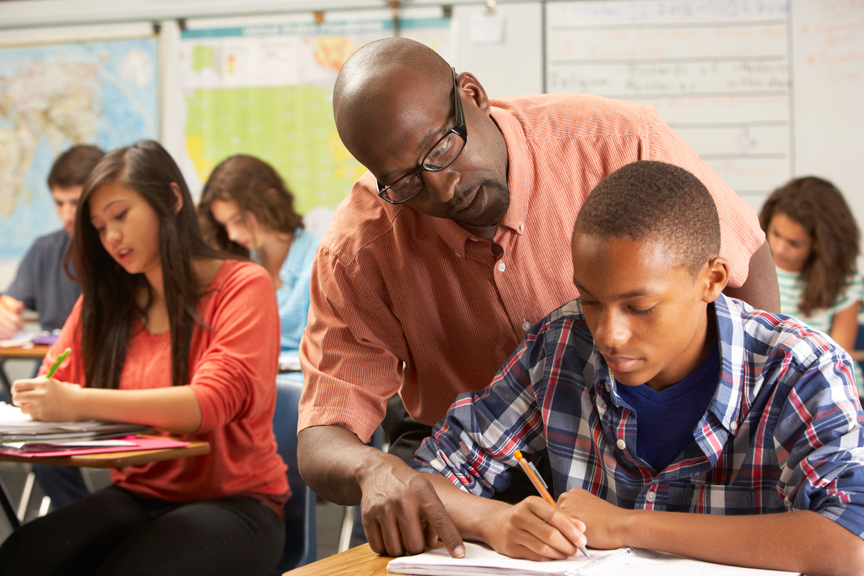- Education
- Parenting
Parent-teacher conferences point beyond high school to future

In this article, you’ll find answers to questions like:
1. What are the benefits?
2. How to juggle multiple teachers?
3. What are points to discuss?
By the time your child is in high school, you probably consider yourself a pro at parent-teacher conferences. Or, maybe you’ve lost interest in them.
However, it’s good to stay vigilant about checking in, even if your child isn’t having problems. By requesting a conference, you’re showing the teacher that you care about your child’s growth and future beyond school.
“When you are a partner with the school, it is a beautiful thing,” said Doris Saffran, Community Education specialist for the School District of Palm Beach County.
Before conferences, talk to your children about how they're doing. Look at their work they've done so far. Ask whether certain classes are too challenging.
1. WHAT ARE THE BENEFITS?
Don’t forget that parent-teacher conferences are chances for parents to hear from teachers how their child is performing in the classroom, as well as opportunities for parents to air any concerns, says Catherine Tedesco, the school district’s former literacy manager for Elementary Education.
Conferences should end on a happy note and a plan of action. However, if you and the teacher can’t agree on what to do for your child, you may need to meet with the principal.
While teachers are the experts on learning, they should offer you choices. If your child needs additional help, the teacher may bring in a team to work on an individualized education plan (IEP) for the school year.
In high school, things change — a lot. Even though many parents stop attending conferences, it’s important to stay in touch and on top of problems.
2. HOW TO JUGGLE MULTIPLE TEACHERS?
Each one of your child’s teachers in their specialty should tell you exactly how your child is performing. But you also will spend less time with each teacher at a scheduled parent-teacher night. So it’s even more important to prepare one or two key questions for each teacher.
There’s also even more homework now, and this is when students might begin struggling to keep up. You should ask if your child turns in assignments on time. If not, ask for guidance in helping manage their time.
You may also want to know how much time your child should spend on homework for each subject. Find out if extracurricular activities are getting in the way of getting everything done. You also may want to know what the teachers think about your child's future academic or career interests.
3. WHAT ARE POINTS TO DISCUSS?
• Share family events with the teacher. A new baby, a divorce or a death can impact your child’s behavior. This gives the teacher insight.
• Tell the teacher if you speak a different language at home. If your English is not strong, the teacher can arrange for a translator to join your conference.
• Write down a plan with the teacher, including what you can do to help your child learn.
• Schedule an appointment in a few weeks to follow up on your plan.
• Afterward, sit down with your child about the conference. Discuss how you will help and ask for suggestions.
SOURCES:
• Doris Saffran, Community Education specialist, School District of Palm Beach County
• Catherine Tedesco, former literacy manager of Elementary Education, School District of Palm Beach County
You May Also Like
-
- Education
- Other
- Parenting
Worried about paying for college? Experts can help
There are a number of options when it comes to paying for college. Our local experts recommend to start planning early to ensure you'll have the resources. Read on for more of thei …
Read More -
- Health
- Parenting
- Safety
Tell kids to use their heads — wear a helmet
Bicycle helmets can reduce the chances of head injury by 85 percent and severe brain injury by 88 percent. See more expert tips here to prevent a bike accident. …
Read More -
- Behavior
- Parenting
- Safety
Ages 14-18: Keep communicating during this life-changing stage
At this age, older teens' sense of responsibility increases, and intimate and romantic relationships develop. Read on for more insight about key developmental milestones from our e …
Read More
Related resources
-
- Education
- Things to do
Palm Beach County Library System
Children's Clubhouse — activities, story times, books, events and more.
561-233-2600 Website -
- Education
- Parenting
School District of Palm Beach County
Exceptional Student Education — services for gifted students and students with special learning needs who have an individualized education program (IEP)
561-434-8740 Website -
- Education
- Health
School District of Palm Beach County
Child Find — screening, evaluation, services and placement of children with special learning needs
561-434-7337 Website -
- Education
- Parenting
- Things to do
BRIDGES of Palm Beach County
Ten neighborhood hubs help parents raise children healthy, safe and strong
561-740-7017 Website
